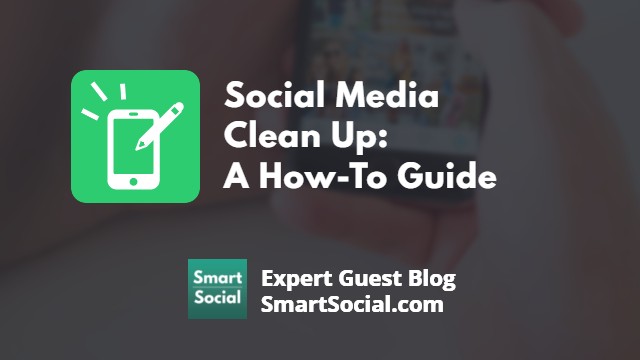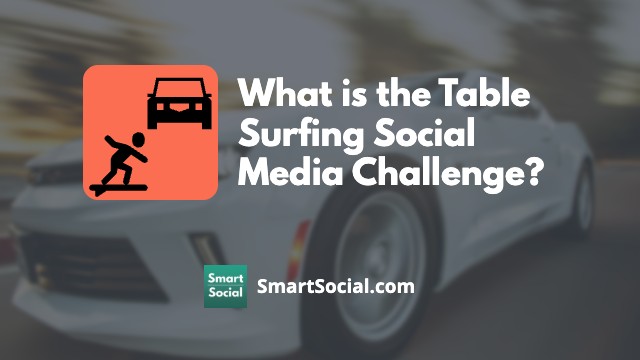Social Media Clean Up - A How-To with Tips From 10 Experts
Green Zone App
(Click here to learn more)
Dangerous Social media challenge
(Click here to learn more)
Red Zone App
(Click here to learn more)
Gray Zone App
(Click here to learn more)

With social media, it’s so easy to hide behind a screen and hit “send” that many don’t always consider the consequences for their digital footprint. Although social media networks like Instagram allow you to connect with like-minded people from all over the world, every comment or photo you post could potentially harm your reputation later in life. This is where a social media clean-up comes in handy.
What is a social media clean-up?
- A social media clean-up means organizing and decluttering your online space. It includes anything from updating privacy settings, unfollowing profiles, and deleting questionable posts
- It entails removing anything that could have a negative impression on your identity and ensures your digital footprint fits an image consistent with your interests and values
- A social media clean-up ensures students’ profiles have a positive presence to give them a leg up when college and job recruiters review their profiles
Why should parents & educators care?
- A questionable social media presence could potentially show red flags and lead to a college rejection letter
- A positive social media presence will help deter scandals from cropping up during the job application process
- Cybercriminals can learn a lot about your student from their social media accounts and use that information against them
What can parents & educators do?
- Discuss with your student what they want to be known for and their current and future goals. Help determine what is appropriate for them to post to create the image they want prospective colleges, employers, and others to see
- Have an open dialogue with your child and guide them in learning what text and photos are appropriate to post online, along with what accounts and pages would benefit their online presence
- Determine what platforms are best for your child to use to build a positive social media resume to be noticed by job recruiters and colleges
- Perform a basic Google search on your student's name. Check the first few pages of results to see what kind of information and images are appearing
Other resources
Student’s Guide to Writing High School Resumes with AI
6 Ways to Build a Positive Online Resume
Combat Online Bullying: Supporting Positive Student Behaviors on Campus and at Home
Keep scrolling to learn from the experts about the importance of a social media clean-up and how it can improve your child’s online presence.
1. Know what is out there

Andrew Selepak, Social Media Professor, University of Florida
The best way for students to clean up and protect their online presence is to do a regular social media audit. Students should reexamine their Instagram account posts, go back through their X (Twitter) posts with Advanced Search, check their TikTok videos, and review their daily Facebook Memories notifications for posts that no longer accurately reflect their views, contain questionable content, or could damage their reputation.
Too often we make posts when we are emotional that don’t accurately reflect our true views or at least our more articulate and subdued views. [These can also include] posts we made when we were younger that embarrass us today.
While it is always important to pause before making a social media post that might be made in anger or despair, it is just as important to pause and review any old posts that were made under similar emotional distress, or made without thinking. Parents and educators should also remind students that posts made today for likes, comments, and follows, could be the same posts that prevent a student from getting a job, internship, or letter of recommendation tomorrow.
Andrew Selepak discusses social media reputation management and branding on the SmartSocial.com Podcast.
2. Make reviewing and cleaning a practice

Mo Mulla, Founder, Parental Questions
Some tips on how to clean up your old social media posts include:
- Review your posts and delete any that are no longer representative of your current beliefs or ideas
- Remove any identifying information (e.g. your location, contact info) from your posts
- Use privacy settings to restrict who can see your post
- Make it a practice to regularly review your social media posts and delete any that are no longer relevant
- Set a time to clean up your social media posts and online profiles quarterly, yearly, or as needed. Know what you want to keep and what you want to delete
3. Mean what you post

Michele Ramsey, Associate Professor, Communication Arts & Sciences and Women’s Studies, Penn State Berks
The first thing I talk about with students is that nothing posted online is private.
Ever.
So if students use bad judgment when posting on social media, that momentary lapse of judgment can stick with them for years to come. We all make mistakes, have lapses in good judgment, and are just plain imperfect humans.
Sometimes we have opinions at one point in our lives that we look back on later and can’t imagine ever having. But with the advent of social media, those momentary lapses or opinions born of ignorance can follow and define students for years. Cache files and screenshots mean nothing is ever really deleted, either. So thinking carefully about posts is very important.
One of the constant refrains I hear from people who don’t want to be told what they can or can’t or should or shouldn’t post on social media is that it’s a free speech issue.
Students must be willing to accept the consequences of what they post, which can never be “taken back,” no matter how many times they apologize or swear that they “didn’t mean” what they said.
In terms of social media overall, students are usually surprised to learn how many people and future employers look at social media when hiring. While most realize that they are taking risks if they post something problematic on a social media site, they often don’t realize that posting only bland material isn’t good for them, either.
Organizations actually do want to see that students have a life with friends, family, and events. They want to see students fitting in with people and having fun. If students don’t have any of those types of posts, employers may assume that they’ve wiped all the potentially negative messages from their profile and wonder why nothing is left and/or assume that they’re not social and may not fit into their organization. Thus, students are often surprised to learn that they should be posting appropriate pictures from typical life events like vacations or weddings.
Students should include expressions of gratitude for people who help them, appropriate humor, support for others, discussions that support the brand they’re creating for themselves linked to their majors/careers, stories/memories about their life without overly dramatic tones or deep secrets, and things that are a continuation of their résumé.
Students should not post about illegal activities, bullying communication, trashing of teachers or complaining about school/classes, any images that others could see as negative, or anything that they wouldn’t be fine with being posted on a public billboard with their name attached.
Also, students should not post when emotional. I encourage students to write those feelings down somewhere else, not online. Finally, students shouldn’t retweet or repost the posts of others that might be inflammatory. Once someone posts something that someone else has said, that student “owns” that post as if they’d been the original poster themselves.
It’s important to know that most companies use social media for hiring and pay attention to grammar and spelling in addition to the content of posts.
So, I also talk to students about using social media to create their brands. Crafting an online brand means that they identify what makes them compelling or different and communicate those things to the world. Ways to create a brand online include blogs and social media posts that help define who they are and what they have to offer as a professional that others do not.
4. Customize your privacy settings

Valerie Barnett, Founder, PleasingCare
Customizing privacy settings is one thing I do to keep my profile private and exclusive for the people I personally know. I usually do this on my social media accounts to ensure that my profile isn't exposed to the public eye. You can do this by going to your privacy settings and customizing it with the features available. There are options there where people can't search you by your name.
If people can still find you on social media, such as Facebook, you can turn on the Only Me or Only Friends feature where your photos and posts are only visible to you and your personal friends. Aside from that, you can also make use of their feature Lock My Profile, which locks your entire profile and your information is hidden. Even your profile picture is not clickable.
By doing this, you are adding an extra layer of safety and protection from people who want to get access to you and your private information. In this present time where people are very advanced and always find a way to take advantage of other people, students should try to always keep a step ahead.
5. Keep or delete: Make the decision

Erik Nilsson, Father, Teacher, & Founder of BookSummaryClub
You can begin by Googling yourself. It sounds simple, but you can dig up many unwanted social media posts, blogs, content, etc., that you don’t want anyone to see.
These negative posts or comments could be a make-it-or-break-it moment for an admissions officer or future employer. So, begin by addressing any risky content or inappropriate photos you are tagged in.
The easiest way to steer clear of any such situation is by changing your privacy settings in those old accounts. One setting, for example, will not allow anyone to tag you without your consent.
Social media users should look back on their profiles when applying for a job or higher education. In recent years, background checks and Google searches have become quite common to double-check what the candidate said in an interview. Hence, clearing your profile of anything offensive that might lower your chances of acceptance should be removed. Here is a list of red flags to look for when deciding whether to keep or delete your old messages:
Delete
• Any provocative videos, pictures, or posts
• Explicit photos that include the use of drugs
• Racist or discriminatory comments
• Complaints about a past workplace and co workers
• Cynical memes or posts
Keep
• Profile content that reflects professionalism
• Content that shows your positive views
• Posts that highlight your personality
6. Think twice about pranks (old or new)

Jeremy Hulls, Senior Editor, Family Destinations Guide
I understand that pranks are one of the ways to create strong bonds with friends. However, pranksters are walking on a thin line between what's funny and what's embarrassing.
I've seen old prank videos from my own social media and I just realized that the prankee isn't having fun. He had a small smile but his head was facing downward. It just seems like he was embarrassed, and the smile he had was just out of peer pressure. I believe that since everyone around is smiling, it may give the impression that everyone is having a good time.
*I deleted it*
I strongly believe that pranks should only be posted with the consent of the prankee. If you're not sure if you should post it or not, ask the person who's at the receiving end of the prank.
7. Before deleting your accounts, be sure to delete individual posts or photos

Arash Fayz, Executive Director, LA TUTORS 123
In order to maintain a positive social media presence, students should consider setting their social media profiles to ‘private’ or ‘locked’ so that only friends can view them.
However, they should also be aware that even if their profiles are set to private, there is still the possibility of their school or classmates accessing their profiles. Students should be cognizant of what they post and not post anything they wouldn’t want screen-grabbed by another student or shared with anyone outside their immediate social circles.
If students decide to leave a social media platform for whatever reason, they should be aware that many platforms will archive their posts or information. Therefore if there is information they don’t want made public on that platform, they should make sure to do a deep clean by updating their pages, deleting tweets, individual posts, or photos before deactivating their accounts.
Students should also be wary of the material being posted and shared within their social circles online. Students should make sure any articles or information they share or repost come from a credible source.
8. Improve your content with positive posts

Aisha Marshall, Co-founder, Creative Label
Complete a biography audit and begin to think of your Instagram account bio as your resume. Be sure to include your name, an appropriate description, contact, call to action, etc. Closely monitor your tagged photos. Be sure all images you are tagged in properly represent you and your personal brand.
Showcase your community initiatives. Are you involved in charities or volunteer projects? Showcase these social impacts on your feed and in a highlight reel.
Delete your oldies (if you still have older social profiles that no longer reflect you, delete them)
9. Moving forward, build a proactive strategy instead of spontaneous reactions

Mark Beal, Assistant Professor of Practice in Public Relations, Rutgers University School of Communication and Information, and author of Engaging Gen Z
Building a positive online presence for today’s students requires a proactive strategy versus a spontaneous reaction. Reacting on social media is being impulsive and mistakes will be made.
Students should aspire to be ‘social media thought leaders.’ Based on their areas of interest, study, and career goals, they should strategically and consistently post relevant content that positions them as a thought leader.
Content can include sharing articles as well as publishing and distributing original content featuring their point-of-view on a timely topic. Additionally, proactive and positive thought-leadership content online should go beyond mainstream social channels and extend to platforms such as LinkedIn, blogs, and even producing their own podcast.
10. Utilize the “Memories” tab on Facebook to bulk edit your old posts

Cat Smith, Get Social with Cat
It’s so easy for students to put something out on social media that they’ll later regret. Almost no one has a spotless online presence. Facebook accounts can go back 10+ years. Yes, that is 10+years’ worth of old opinions, emotional moments, and random polls that accidentally give out personal data. Just imagine going from ten years old to twenty in today’s online world. It could be very embarrassing.
One of my favorite features of Facebook is the “Memories” tab. This page is available on the left side menu under “Explore” or via the lower right menu in the app. Conveniently, your notifications and feed will give you a reminder that “you have memories,” so you don’t have to remember to visit that page every day.
Once you’ve clicked through to the Memories page, you will see all of the Facebook posts you made every year on this day, going back to when you joined Facebook. Trying to clean up your web presence as a whole can be a daunting task filled with anxiety. This is a convenient way to go back in time and take out things you wish you hadn’t said or shared.
You should always be hyper-vigilant about what opinions you share publicly because even if your profile is set to “private” and you pick and choose your friends, posting online is a PUBLIC forum. Think of the Memories Tab as your personal time machine to go back and fix the small mistakes in your digital footprint.
Conclusion
A social media clean-up is an essential step for students to create an online presence that best portrays their values. This process not only helps in making a positive impression on colleges and job recruiters but also safeguards against potential cyber threats. Parents and educators play a crucial role by engaging in open dialogues, guiding appropriate online behavior, and helping students present themselves in the best light.
Protect your family and enter for a chance to win cool prizes
Become a member or log in to learn more on this topic
Protect your family and enter for a chance to win cool prizes

., start learning from this page to earn points!*
Hello, I'm Josh, the founder of SmartSocial.com.
Don't leave this page until you fill out our feedback form that will appear after you learn from the resources...
Here are some of the latest resources at SmartSocial.com
Become a Very Informed Parent (VIP) to get our social media suggestions in your email every Tuesday & Thursday.



Hello, I'm Josh, the founder of SmartSocial.com. Protect your family by taking my 1 minute quiz
This quiz will help you understand how safe your family is


Schools & Districts: Partner with us to protect your community online
Our remote presentations (and website) teach over a million parents and students each year how to be safe so they can shine online. We teach students how their accounts can be used to create a portfolio of positive accomplishments that impress colleges and employers.


Join Our Smart Social Podcast
each week on iTunes
With over 500 episodes, Josh Ochs interviews psychologists, therapists, counselors, teachers, and parents while showing you how to navigate social media to someday shine online.
Listen on:



.jpg)
.jpg)

.jpg)


